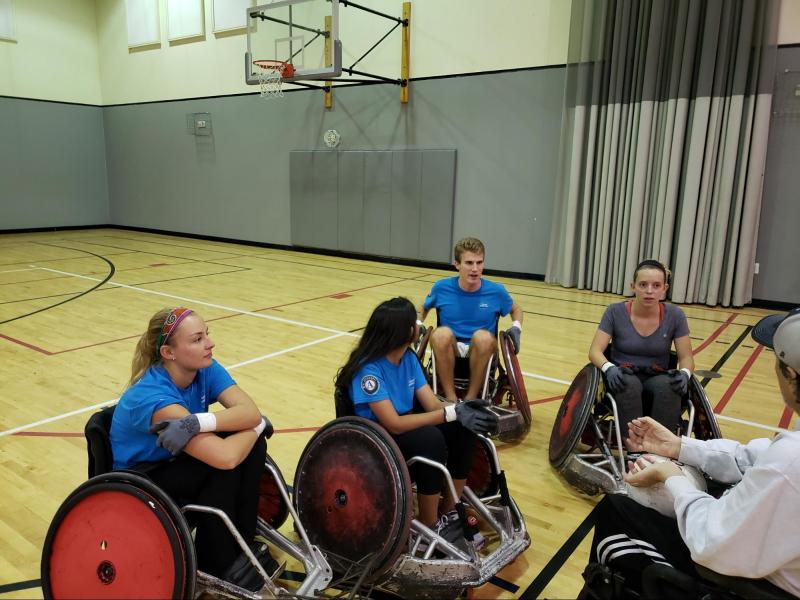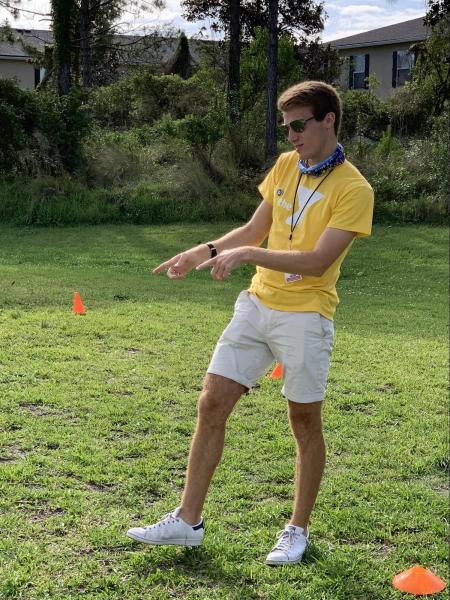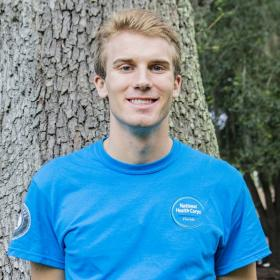What It Feels Like to Get Rammed by a Very Fast-Moving Wheelchair, and Other Musings
The term “disability” gets a lot of buzz. On one hand, classifying people’s conditions as disabilities is important in guaranteeing them fair treatment and protections required by federal laws. On the other hand, “disability” can have a negative connotation, drawing attention to things that a person cannot do. It ignores the fact that people with disabilities are people with diverse and unique abilities and skill sets—something I was forced to confront as I sat helplessly in a rugby wheelchair toppled on its side.
 Outside service has been one of my favorite aspects of my National Health Corps Florida experience. I’ve particularly enjoyed my service with Brooks Rehabilitation, a medical service provider that aims to empower people to achieve recovery and participate in life through rehabilitation. Brooks operates an Adaptive Sports and Recreation program through which I have been able to volunteer at wheelchair rugby practices. During these practices, volunteers assemble and disassemble wheelchairs, set up and facilitate drills for the athletes, and clean up after practice. Occasionally, however, we’re asked to do something truly special—get in the wheelchairs and participate in practice.
Outside service has been one of my favorite aspects of my National Health Corps Florida experience. I’ve particularly enjoyed my service with Brooks Rehabilitation, a medical service provider that aims to empower people to achieve recovery and participate in life through rehabilitation. Brooks operates an Adaptive Sports and Recreation program through which I have been able to volunteer at wheelchair rugby practices. During these practices, volunteers assemble and disassemble wheelchairs, set up and facilitate drills for the athletes, and clean up after practice. Occasionally, however, we’re asked to do something truly special—get in the wheelchairs and participate in practice.
Before attending a practice, I thought of wheelchair rugby as a lesser, modified form of rugby. It only took me getting rammed at full force by a wheelchair athlete to realize this wasn’t an accurate assessment. The skills that the athletes exhibit—their speed, the force with which they hit other wheelchairs, and the deftness they employ when passing the ball—are unlike anything I’ve seen. As I took the hit that toppled me on my side, I finally realized that wheelchair rugby is a sport that requires a special skill set that I don’t possess.
Although the wheelchair athletes that compete with Brooks Rehabilitation are living with disabilities, they refuse to be defined by the things that they can’t do and instead seek empowerment through the things that they can do. Many of the athletes will gladly discuss the stories of their injuries and educate volunteers on how their injuries have affected their life, and it’s clear that they take pride in themselves and their abilities.
When preparing to deliver a Learning Series Committee presentation on disabilities, I interviewed one of my friend’s mothers who has been experiencing deafness since birth. One of the most interesting things that I learned was that she scoffed at the idea that she “wasn’t defined” by her disability. Deafness is a core part of her identity—but not because it defines what she can’t do. Instead, she embraces her deafness and focuses on the things that deafness enables her to perform more effectively. For example, she mentioned an advantage that many of us could do well to emulate—the ability to focus at work without the distraction of workplace gossip.
she embraces her deafness and focuses on the things that deafness enables her to perform more effectively. For example, she mentioned an advantage that many of us could do well to emulate—the ability to focus at work without the distraction of workplace gossip.
My experiences with National Health Corps Florida have taught me a great deal about people living with disabilities. Through all aspects of my service, I’ve seen countless examples of people with disabilities empowering themselves by embracing their identities and using their skills to contribute in unique ways. Even if “disability” sometimes carries a connotation of weakness or insufficiency, people living with disabilities have shown me that they are defined instead by their strength and power. If you don’t believe me, just strap yourself into a wheelchair and let the athletes at Brooks Rehab run into you a few times to change your mind.

This post was authored by NHC Florida member Dustin Sneed.
Dustin serves at the Dye Clay YMCA as a Health Educator.